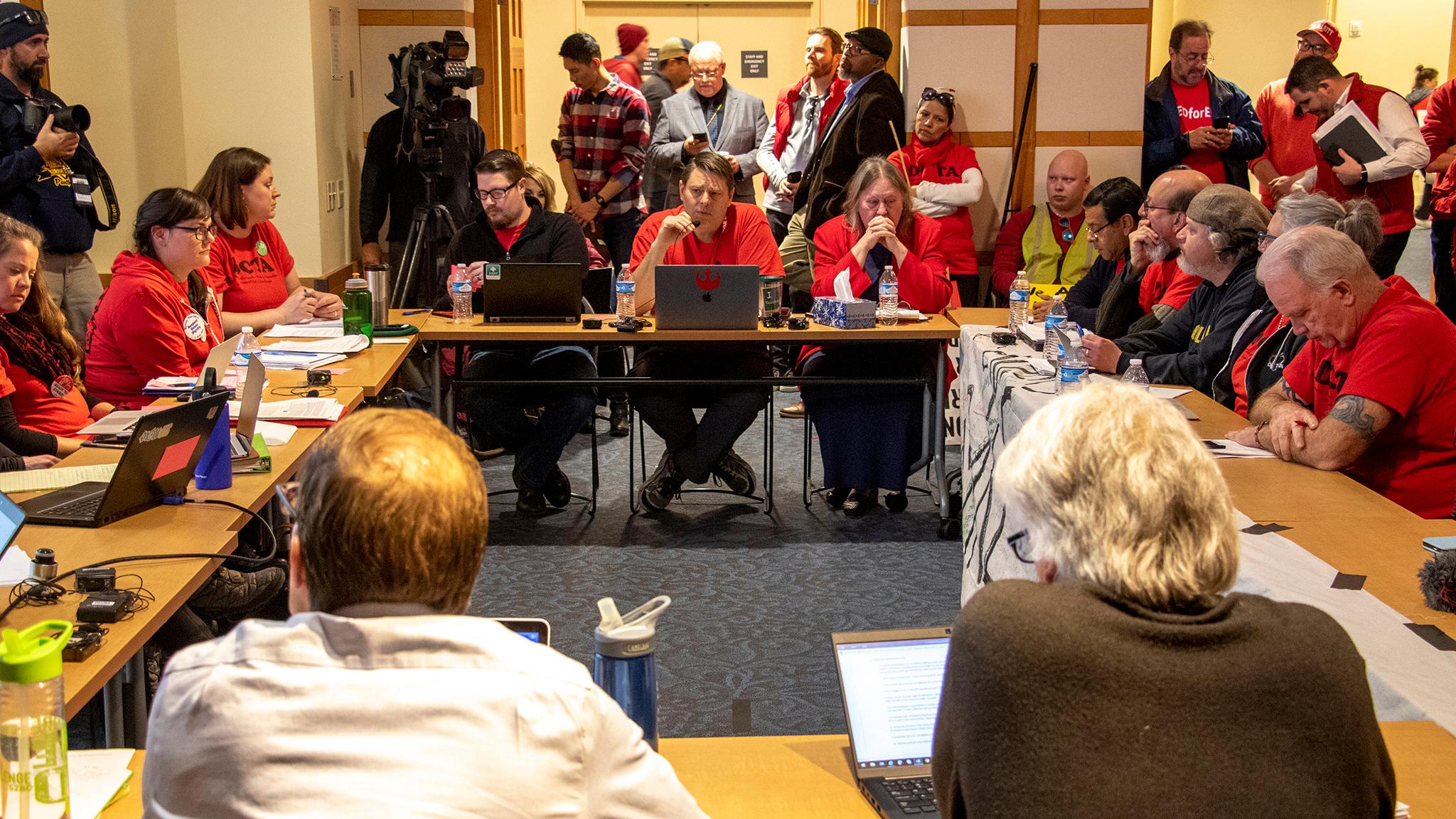After a long, cold first day of a Denver teacher strike seasoned with nuanced concerns and a wide variety of reports from inside schools, representatives from Denver Public Schools and the Denver Classroom Teachers Association are expected to return to a familiar setting -- the bargaining table in the basement of the Denver Central Library.
On Tuesday:
Negotiations went deep into Tuesday night, long after most of the raucous, chanting audience of teachers and supporters had gone home. Both sides sounded positive about the progress during the day, but the strike will continue on Wednesday as negotiations between the district and the union are set to resume at 10 a.m.
Shortly after 5 p.m., shortly after one of the day's many breaks during which the representatives from both sides retreated to discuss the latest round of tweaks to a complicated compensation system, negotiators returned to a room that was substantially less crowded than it had been earlier in the day. The onlookers -- mainly teachers and supporters, many with signs and red DCTA T-shirts -- had begun filing out, citing family obligations, second jobs and other reasons.
The district presented another set of criteria for creating seven "lanes" for teacher's salaries -- the outline for teachers seeking to increase their pay raise.
The "lanes" are defined by a combination of experience, degrees and professional development options (which they discussed earlier on Tuesday). The teachers union are seeking more clarity for how teachers can "move" in these "lanes," which is why the district has tried presenting new guidelines.
The two sides went back and forth on the specifics of how professional development can be factored into a teacher's salary. DCTA President Henry Roman said the two sides are considering how to use professional development to advance teachers' salary schedule, which is one of the three big factors they're trying to come to an agreement over.
In the afternoon, Roman had said it was hard to say whether they would be done by the end of the day.
"Hopefully, the next round, we can get closer and get it done," he said.
Negotiations had resumed around 3 p.m. after a three-hour break during which union representatives considered a new proposal from the district. During the long break, teachers chanted and sang as they waited for updates, while some had pizza courtesy of Mayor Michael Hancock. At one point, library staff asked the teachers to be quieter -- no more bullhorns or drums.
Negotiations had resumed Tuesday morning following the first day of a teacher strikes involving more than 3,000 educators across the district.
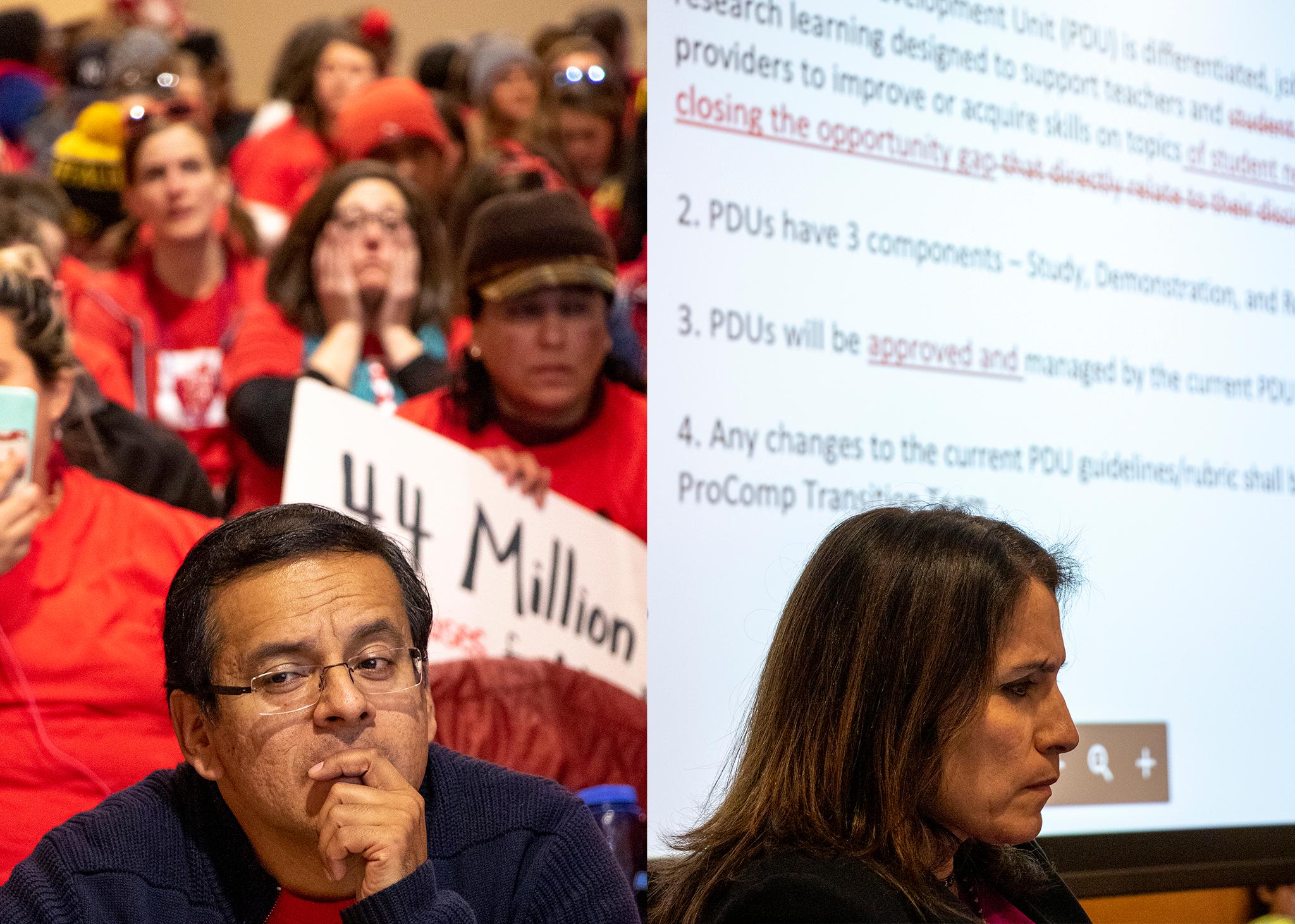
Members of the DCTA bargaining team received a rockstar welcome as they walked into the basement of a conference room at the Denver Central Library branch on Tuesday. The room was standing-room only, similar to previous bargaining meetings. There was a sea of red T-shirts, marking support for the picketing teachers.
"I am very pleased we are back at the table today," Superintendent Susana Cordova said after walking in, adding that she was committed to getting an agreement in place over the teachers' base compensation, salary schedule and professional development. Disagreements on how to fund these areas are the root cause of the conflict between the two sides.
Cordova began outlining the new agreement on Tuesday after 10:30 a.m. There was no timeline in place for negotiations -- early indications suggested they could last all day. A federal mediator was also present at Tuesday's negotiations.
Negotiations began Tuesday morning with a private meeting between a new mediator and representatives from both sides, Chalkbeat reported.
Denver public schools said in a letter Tuesday evening that all DPS schools would be open tomorrow regardless of the outcome of that day's negotiations.
"We appreciate the work and dedication of the staff all across the city who have been critical to keeping our schools open this week," the letter from DPS read. "And we also appreciate the support and understanding of our parents and community members."
What we're seeing out there today:
Outside of the Denver Center for International Studies, teachers and students lined both sides of 6th Avenue, crossing the street during red light stops to wave signs and bang on drums in front of traffic.
"I hope we come to an agreement as soon as possible, I need to be in my classroom," said Kevin Adams, an 8th and 12th-grade social studies teacher at DCIS. "That is what I love to do, that is where I need to be, that's where I have all the energy for the kids. But given the way the district has behaved, I assume that - I don't have high hopes for the bargaining session today."
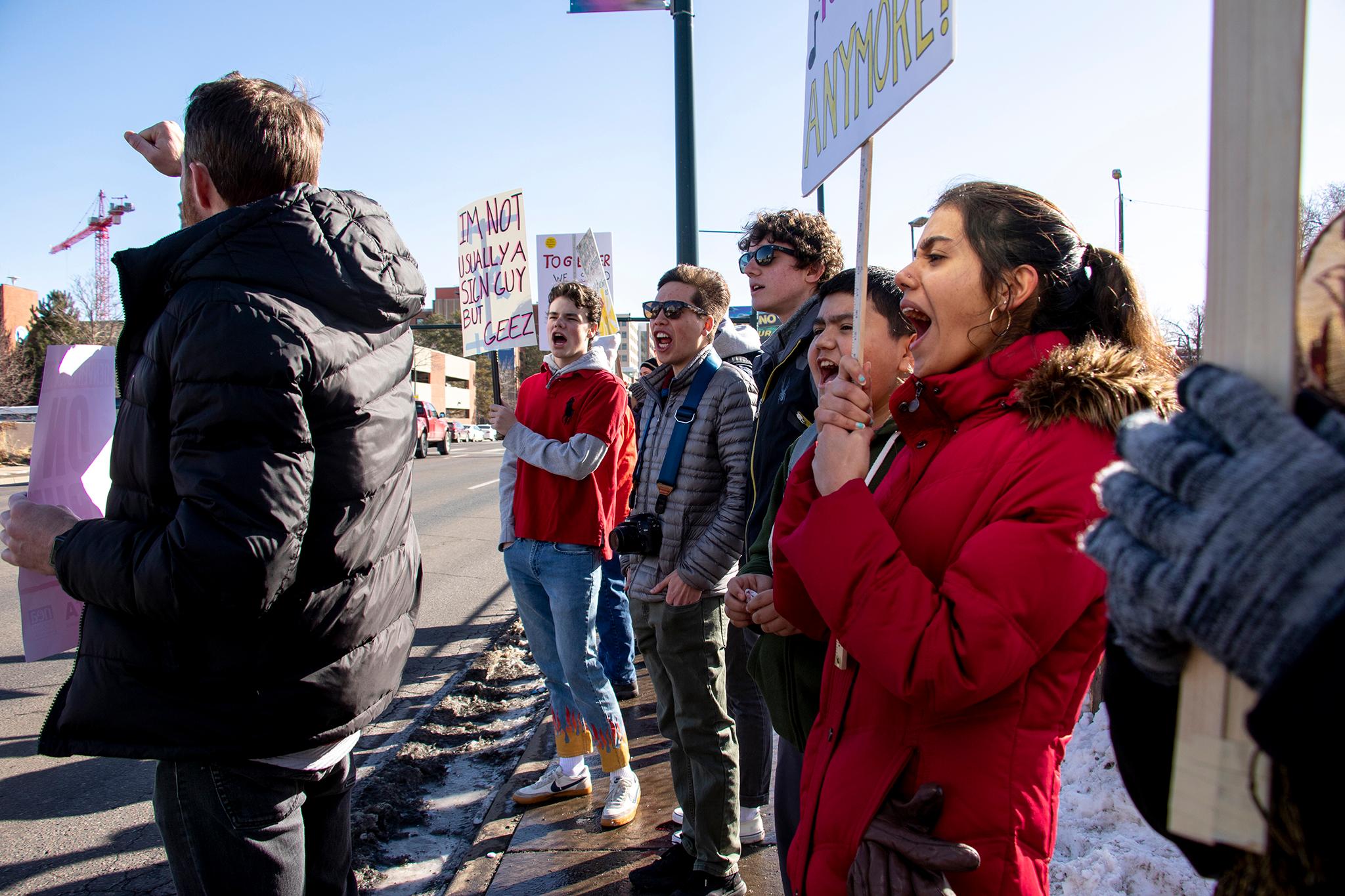
Jocelyn Arguelles, an 18-year-old senior at DCIS was picketing with teachers on 6th Ave.
"Teachers, they do so much for their students and this really shows the gratitude," she said. And besides, she didn't think she was missing anything in class. "They're probably just sitting on the floor in the gym or in a classroom with a worksheet that has nothing to do with anything we're supposed to be learning."
At South High School, picketing had more or less wrapped up for the morning around 9 a.m.
Kurt Scheumann, a strike captain and an English teacher at South, mostly for juniors, was helping wrap up and said he wasn't optimistic about Tuesday's bargaining session.
"My gut tells me that they're going to try to starve us out another day," he said. "Yesterday, they were testing the waters and seeing how many teachers are actually going to walk, what do schools actually look like. Now they've got a gauge of that. Now, day 2: I think they're going to try to test our stamina."
As for students, he said it's pretty quiet at South.
"Yesterday our kids did a really peaceful protest, they did a walk out and then probably 200 kids joined the picket line," he said. "I think things are not going as normal, but based on who I'm talking to inside the building, things are very safe, the kids are confused and bored and they're not learning anything.
"The lesson plans that the district sent out were a waste of time and money. Kids are packed into the auditorium, into the gyms and into the cafeterias."
"I'd guess maybe there's maybe 200-300 kids in there today, out of 1,600," he said. "Seeing the parking lot this bare and the number of kids we saw getting off the bus today was way less than what I would typically see."
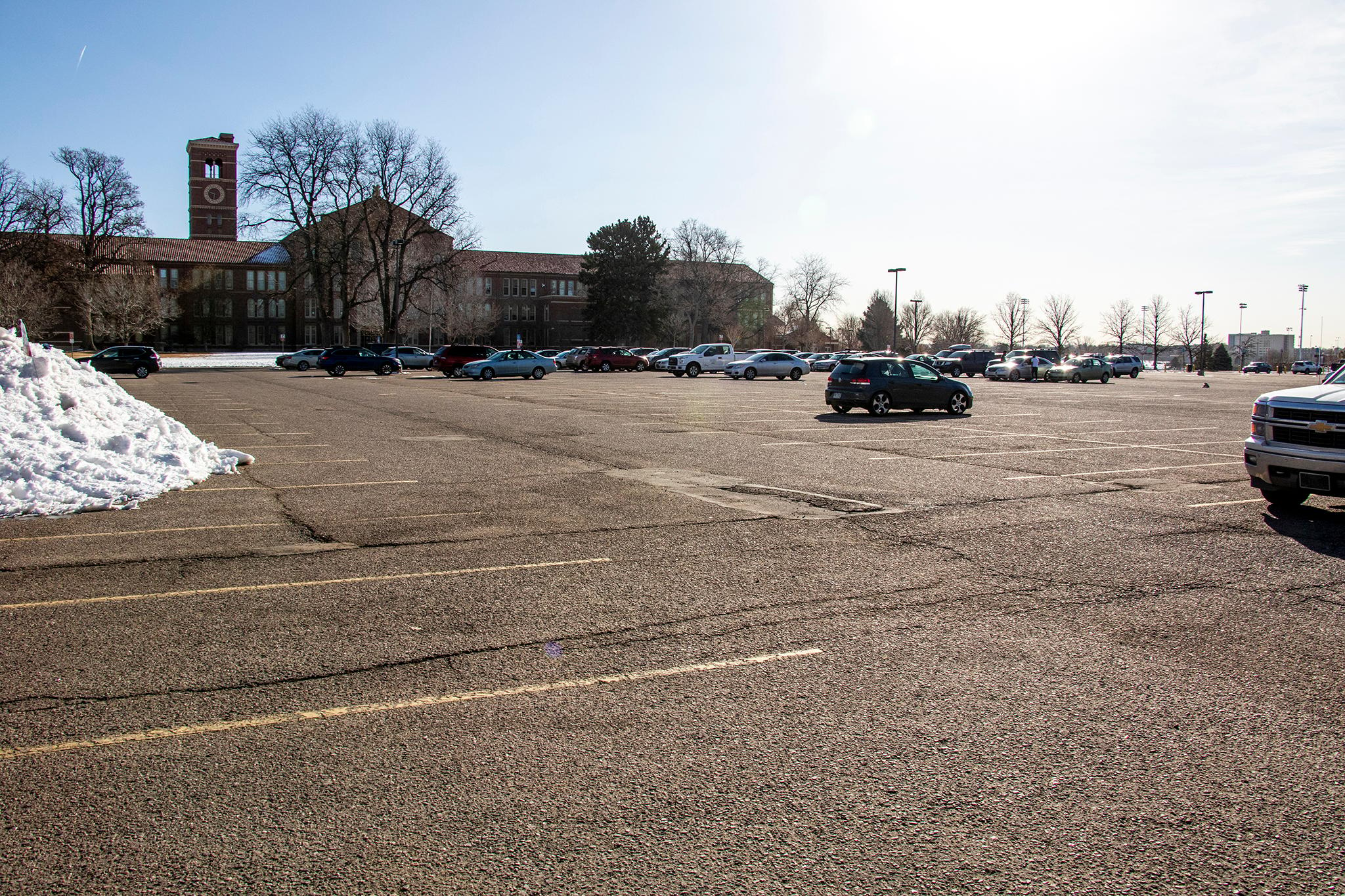
East High School, site of perhaps the most dramatic scenes from the first day of the teacher strike, wasn't quite as packed with picketers on Monday. But there were still teachers, students and supporters out near Colfax Avenue asking cars to blow their car horns while blasting their own music.
East High School seniors Sara Merman, Will Leonard and Averi Jackson came to school at about 8 a.m. on Tuesday but said there wasn't a lot going on inside. Merman said seniors were told to go to the auditorium for schedules (students said they ran out of schedules on Monday) and were then told to go to the third-floor library, where Leonard said there wasn't much going on, either.
"My parents told me to go to school but they said if there's nothing happening to just go home and work on homework and college stuff," Merman said.
The three said they were supportive of the teacher strike and had participated in Monday's walkout.
"If you can't afford to live in the area that you're working and you have to go and drive like 25 minutes a day to get somewhere you can work, I think they definitely need to get their pay raised," Leonard said.
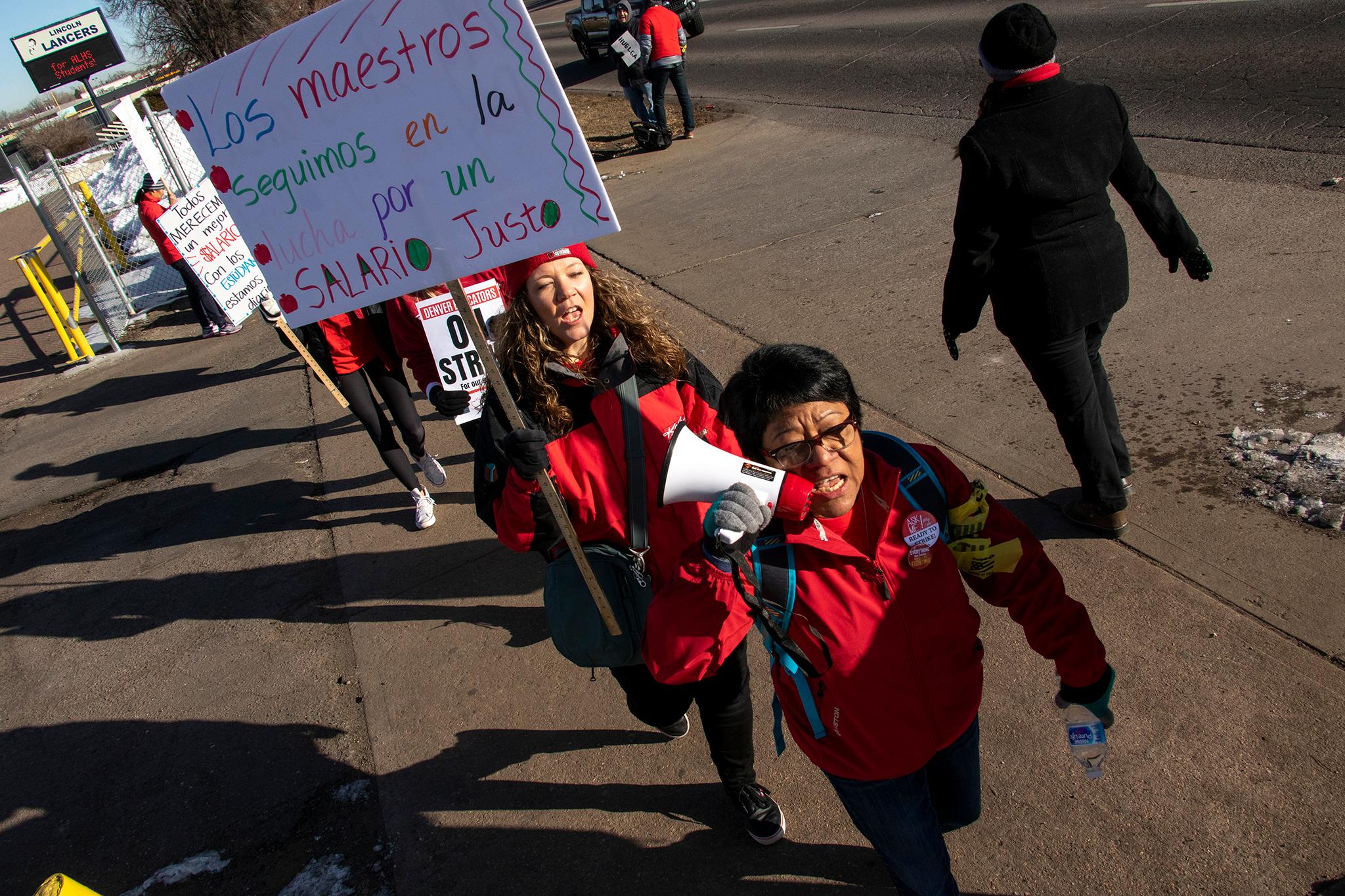
East math teacher Aaron Lowenkron said Monday morning while picketing outside that he still felt like things were at a standstill.
"(The district's) not budgeting," Lowenkron said. "They continue to insist on incentives that have been demonstrated over the past three years to fail our students."
Lowenkron is referring to bonuses, which the teachers want to see less of, as they see it as a way for the district not to meet the teacher's base pay obligations. Lowenkron said it's not a question about what's enough, but what's best for students, since he said the incentives alone haven't done much to help the district curb its high turnover rate.
"We have the second-highest turnover rate on the front range," Lowenkron said. "If the bonuses worked, none of us would be here. This wouldn't even be a thing."
Crash course:
Need the high-level info on the strike? Among other things, teachers are upset about compensation -- basically, they say they're not getting paid enough, and that a pay structure once thought to be clever and focused on equity has turned out to be unpredictable and ineffective. The district agrees on some points, but not others, and talks broke down dramatically over the weekend.
The New York Times just packaged it up for a national audience. Start here.
So what now? How many kids are showing up? How many teachers are actually striking? How are schools handling the kids who've shown up without anybody to teach them? Chalkbeat has 10 things to watch today, plus context.
The question people always ask: But isn't marijuana money supposed to be fixing this? No. Here's a recent Denver Post story about where that money goes.
Monday highlights:
Monday was the start of the first Denver teachers strike in more than 20 years. DCTA, the teacher's union, said 3,769 teachers and special service providers participated in picket lines. The District said 2,631 out of 4,725 teachers did not report for work, according to Chalkbeat.
A little more detail there:
DPS doesn't just educate 93,356 students -- it feeds thousands of them. The district has been stressing in the lead-up to the strike and since it began that its cafeterias would be working as usual. The families of 67.3 percent of DPS students earn so little that their children are eligible for free and reduced meals. For a family of four, that means earning less than about $38,000 to be eligible for a free breakfast or lunch or less than about $46,000 to be eligible for a reduced-priced meal.
DPS said it served 22,796 breakfasts Monday.
In its preparation for the strike, the city extended the hours of the Free Healthy Meals programs at Denver recreation centers. Tracy Breckenridge, communications director for Denver's Office of Children's Affairs, said the programs served 499 snacks or meals Monday. She added the after-school meal sites opened at different times, with a few starting at 1 p.m. and others anywhere from 2 p.m. to 5 p.m. They closed as late as 8 p.m.
Read more about what happened yesterday inside classrooms and outside of schools here.
